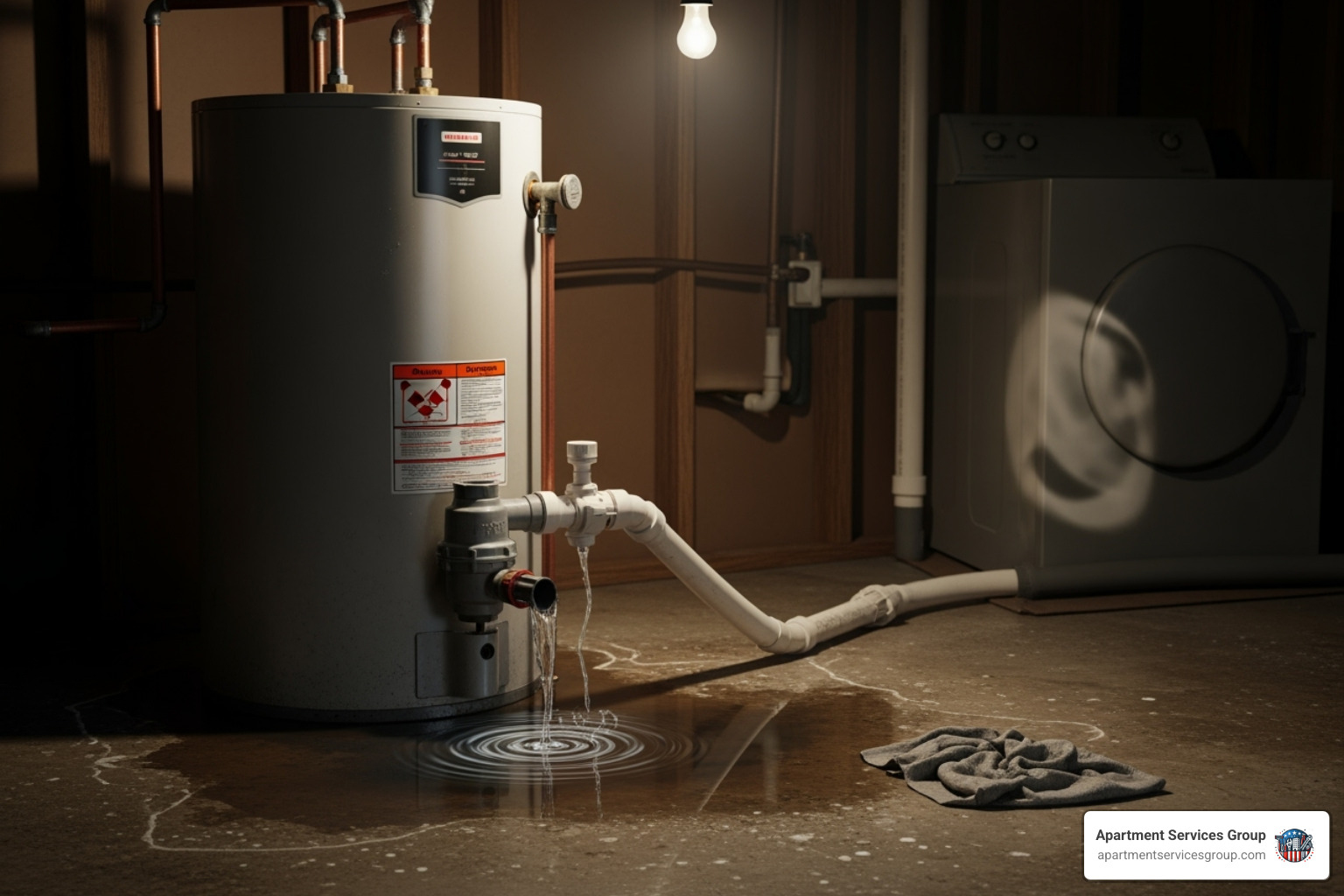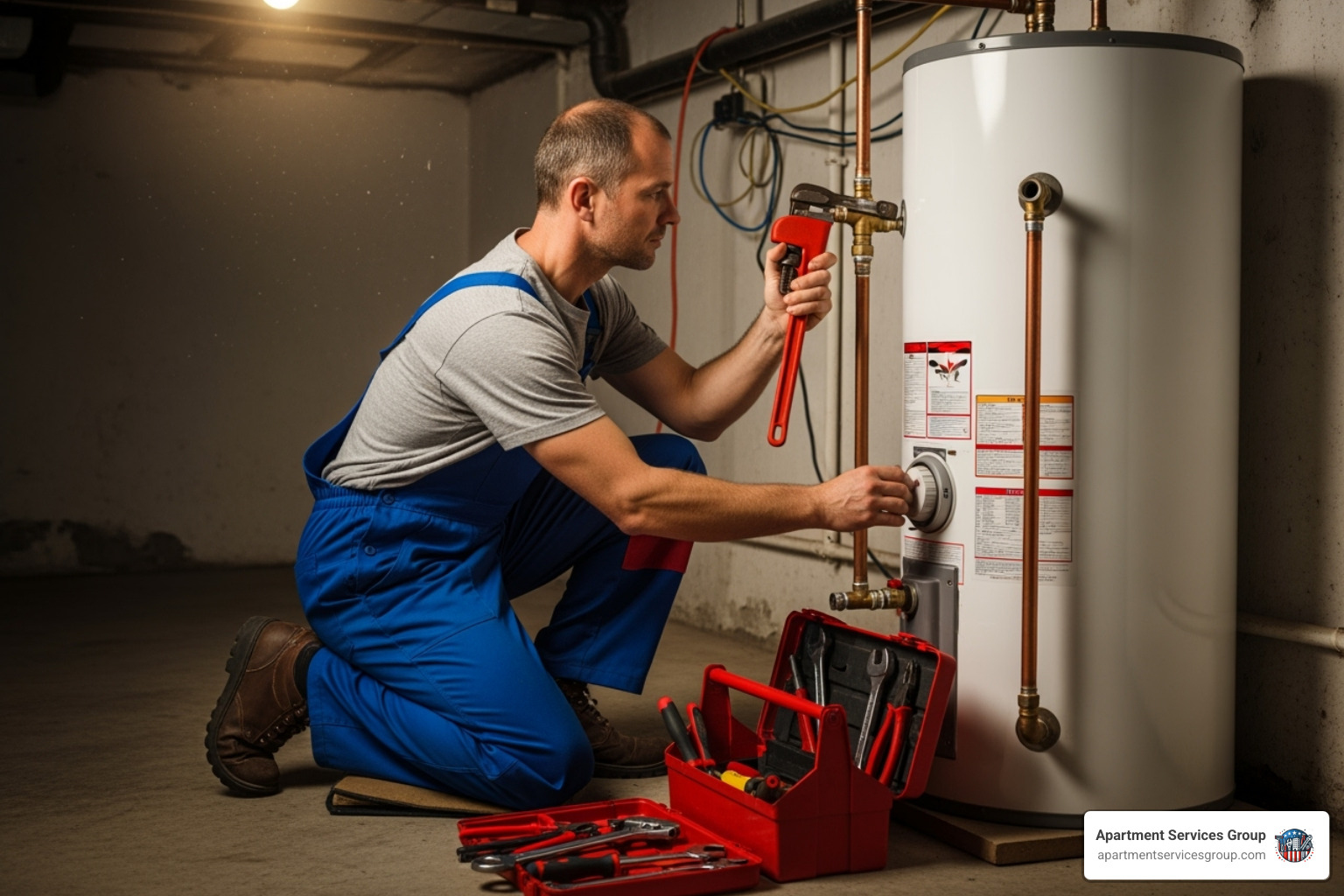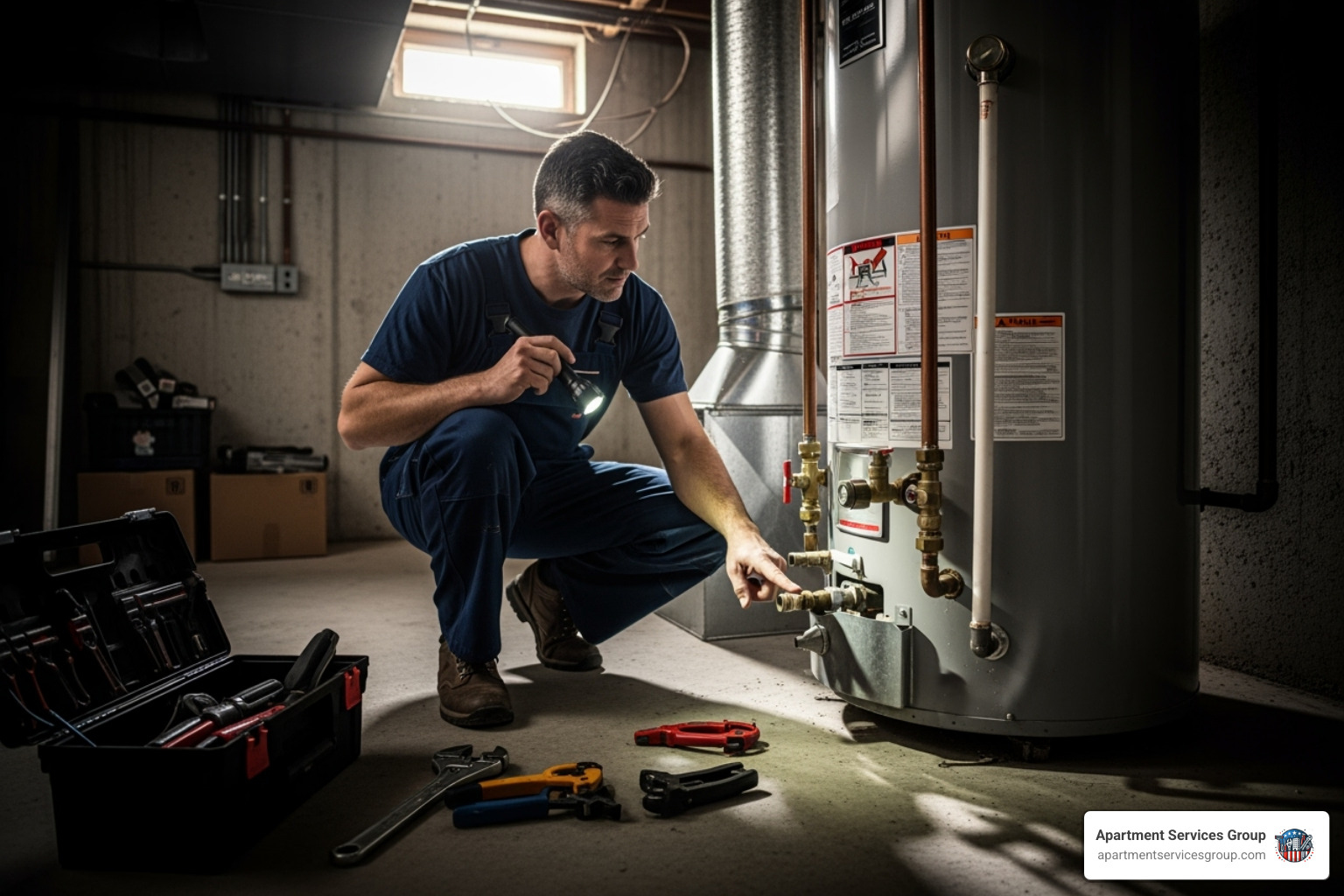Water Heater Repair: Stop Leaks Fast 2025
Why Water Heater Issues Can’t Wait
Water heater repair is an issue no property manager wants to face, but when tenants are left without hot water, it becomes an urgent priority demanding immediate attention.
Quick Water Heater Repair Solutions:
- No hot water – Check pilot light (gas) or circuit breaker (electric)
- Strange noises – Usually sediment buildup requiring professional flushing
- Leaking water – Shut off water supply and call emergency repair service
- Lukewarm water – Likely thermostat or heating element failure
- Rusty water – Indicates internal tank corrosion or anode rod replacement needed
The average water heater lasts 10-15 years, but problems can strike at any time. Reliable service is crucial, as responsive professionals can quickly resolve issues and maintain tenant satisfaction.
Common causes of water heater failure include sediment buildup, failed heating elements, thermocouple issues, and internal corrosion. For any property manager, these problems can quickly escalate from a minor inconvenience to a major tenant satisfaction issue.
Emergency repairs for simple fixes often cost between $100-$300, while major component failures can run $400 or more. The key is knowing when to repair versus replace—and having reliable professionals on call.
As the owner of Apartment Services Group, I’ve seen how quickly water heater repair issues can spiral without a proper response. With over eight years helping Houston property managers, I understand the urgency of restoring hot water to keep tenants happy.
Is Your Water Heater Crying for Help? Telltale Signs You Need a Repair
An ice-cold shower is a rude awakening that your water heater has failed. The good news is that water heaters rarely fail without warning. Learning to recognize the telltale signs can save you from emergency repairs and keep your tenants happy.
No hot water is the most obvious sign. For electric units, this often points to a tripped circuit breaker or failed heating element. Gas water heaters might have pilot light issues or a faulty gas control valve.
Lukewarm water that never gets hot enough suggests failing heating elements or significant sediment buildup inside the tank, reducing its heating capacity.
Inconsistent temperatures that fluctuate between hot and cold often indicate a faulty thermostat or heating elements that are working intermittently.
Leaks or pooling water around the base of your water heater are an immediate red flag. Leaks can come from loose connections, a faulty temperature and pressure (T&P) relief valve, or a crack in the tank itself.

Discolored or rusty water from hot water taps indicates internal corrosion. This could mean the anode rod has failed or, more seriously, the tank is rusting from the inside out.
Strange noises are another key indicator. Popping and rumbling sounds usually mean sediment has settled at the bottom of the tank, causing water to boil and create mini steam explosions. Hissing can indicate a leak or dangerous pressure buildup.
Low hot water pressure, especially when compared to the cold water flow, suggests a clog from mineral buildup somewhere in the hot water lines.
When you notice any of these warning signs, it’s time to call for professional water heater repair before a minor issue becomes a major headache.
Unpacking the Problem: Common Water Heater Failures
When your water heater acts up, it helps to know what might be going wrong. Water heater repair calls often involve a handful of recurring issues, but the specific cause depends on whether you have a gas or electric unit.
Gas Water Heater Problems
Gas water heaters have several common points of failure related to their combustion system.
Pilot light issues are the most frequent problem. If the pilot light won’t stay lit, it’s often due to a draft or a faulty thermocouple.
Thermocouple failure is a common safety-related issue. This sensor shuts off the gas supply if the pilot light goes out. When it fails, it cuts the gas permanently, preventing the heater from working. Replacing a thermocouple is a standard water heater repair.
A faulty gas control valve can cause erratic behavior, from no hot water to scalding temperatures, as it regulates both gas flow and temperature.
Burner assembly problems often reveal themselves through an improper flame color. A healthy flame is blue; yellow or orange flames indicate incomplete combustion due to dirt or component failure, resulting in poor heating.
Electric Water Heater Problems
Electric water heaters are simpler but have their own set of potential electrical faults.
Failed heating elements are the most common issue. Most units have two elements; if one fails, you’ll have less hot water, and if both fail, you’ll have none. Elements are replaceable.
A tripped reset button can sometimes be an easy fix. This safety button trips when the water gets too hot. If it keeps tripping, it signals a more serious underlying problem.
A faulty thermostat can lead to unpredictable water temperatures. Since electric units often have two thermostats, a failure in one can cause water to be too hot, too cold, or inconsistent.
Electrical connection issues like loose wires or tripped breakers can cause intermittent failures that are difficult to diagnose.
Universal Problems (Gas & Electric)
Some problems affect both gas and electric water heaters.
Sediment buildup from minerals in the water settles in the tank, forcing the unit to work harder and causing rumbling or popping sounds. This is a common issue in areas with hard water, like Houston.
A corroded anode rod is a sign the sacrificial rod has done its job. This metal rod is designed to corrode to protect the tank. Once it’s gone, the tank itself begins to rust, leading to discolored water and eventually leaks.
A leaking T&P valve (temperature and pressure relief valve) is a critical safety issue. It may leak because of excessive pressure in the tank or because the valve itself is faulty.
Tank leaks are the worst-case scenario. A leak from the steel tank itself, not a fitting, indicates internal corrosion has breached the tank wall. This almost always requires a full replacement, not a repair.
The Big Decision: Repair vs. Replacement for Your Water Heater
When a water heater fails, property managers face a critical decision: repair or replace? The right choice depends on several factors and can significantly impact your budget and tenant satisfaction.
| Factor | Repair is Likely Better | Replacement is Likely Better |
|---|---|---|
| Age of Unit | Under 10 years old | Over 12-15 years old |
| Cost of Repair | Less than 50% of new unit’s cost | 50% or more of new unit’s cost |
| Problem Severity | Minor issues: thermostat, heating element, pilot light | Major issues: tank leak, frequent breakdowns |
| Energy Efficiency | Not a primary concern | Desire for improved energy efficiency |
| Hot Water Needs | Current capacity is sufficient | Need for greater capacity or tankless system |
| Frequency of Issues | First major issue | Frequent, recurring breakdowns |
Understanding Water Heater Lifespan
Most conventional tank water heaters last 10-15 years. In contrast, tankless units can last 20 years or more with proper care, as they don’t constantly store and reheat water.
Several factors influence a unit’s lifespan:
- Water quality: Hard water with high mineral content causes sediment buildup and corrosion, shortening the unit’s life.
- Installation quality: A properly sized and installed unit will perform more reliably and last longer.
- Usage patterns: Higher demand puts more wear and tear on components.
- Regular maintenance: This is the most critical factor. Annual flushing and anode rod checks can add years to a water heater’s life. For more information on maintenance best practices, see these water heater maintenance tips from the Department of Energy.
When to Choose Water Heater Repair
Repair is often the best choice in these situations:
- The unit is under 10 years old and still has significant service life remaining.
- Repair costs are low. Simple fixes for thermostats or heating elements ($100-$300) are much cheaper than a new unit ($800-$2,000).
- The issue is a minor component failure, not a sign of widespread system decline.
When Replacement is the Smarter Choice
Sometimes, investing in a new unit is more cost-effective long-term:
- The tank is leaking. A corroded steel tank cannot be repaired and is a definitive sign that replacement is necessary.
- The unit is over 12-15 years old. At this age, it’s living on borrowed time, and repairs may only postpone the inevitable.
- Repairs are frequent and costly. If you’re constantly calling for water heater repair, the cumulative cost can quickly approach that of a new unit.
- You want better energy efficiency. Modern water heaters are far more efficient, and units made since 2016 have double the insulation, leading to lower utility bills.
- A major part fails on an old unit. An expensive repair on an aging system is often a poor investment compared to the value and warranty of a new water heater.
Finding a Professional for Your Water Heater Repair
When a water heater fails, the professional you choose can mean the difference between a quick fix and a costly, drawn-out problem. For a property manager, having a reliable technician on call is essential.
The Value of 24/7 Emergency Service
Water heaters often fail at the worst possible times. A 24/7 emergency service is invaluable for several reasons:
- Preventing water damage: Technicians can quickly stop leaks before they cause extensive damage to floors and drywall.
- Restoring essential service: Fast repairs keep tenants happy and protect your property’s reputation. Hot water is a necessity, not a luxury.
- Peace of mind: Knowing qualified help is available around the clock allows you to confidently assure tenants that a solution is on the way.
- Handling sudden failures: Emergency professionals are equipped to handle urgent and dangerous situations, such as a complete system shutdown or a gas leak, safely and effectively.
Why Expertise and Experience Matter
Water heater repair involves electricity, gas lines, and pressurized water, making it a job for experts, not a DIY project.
- Licensed and insured technicians protect you from liability for damages or injuries during the repair.
- Knowledge of different types is crucial. A qualified professional can diagnose and repair gas, electric, and tankless models correctly.
- Safety protocols are non-negotiable. Experienced technicians know how to handle gas lines, test for carbon monoxide, and manage electrical components without creating hazards.
- Ensuring code compliance protects your property from future issues and ensures all work meets local safety standards.

How to Get an Accurate Quote for Water Heater Repair
To avoid surprise costs, provide your technician with as much information as possible to get an accurate quote upfront.
- Problem description: Be specific. “Lukewarm water” points to a different issue than “no hot water at all.”
- Unit age and type: The age and whether it’s gas or electric help a technician anticipate likely problems.
- Photos of the unit and data plate: A picture of the unit, its surroundings, and its data plate (with model and serial numbers) gives professionals the technical details needed for an accurate diagnosis and parts order.
With this information, a reputable company can provide transparent pricing. For Houston-area apartment communities, Contact Apartment Services Group for a clear estimate.
Frequently Asked Questions about Water Heater Maintenance
Property managers frequently ask about water heater repair and maintenance. Here are answers to the most common questions we hear from Houston apartment communities.
How much does a typical water heater repair cost?
Water heater repair costs vary, but understanding the typical ranges helps with budgeting.
- Simple repairs: Expect to pay between $100 and $300 for common fixes like replacing a thermostat or relighting a pilot light.
- Major part replacements: Costs can start around $400 or more for parts like heating elements or gas control valves.
- Cost factors: The final bill is influenced by the cost of the part, labor time, and whether emergency after-hours service is required.
Always get a quote before work begins to ensure transparent pricing with no hidden fees.
Can I perform the repair myself?
While DIY repairs are tempting for budget reasons, water heater repair involves significant risks.
- Electric units: If you are experienced with electrical work, you might be able to replace a heating element or thermostat after shutting off power at the breaker. However, mistakes can be dangerous.
- Gas units: We strongly recommend professional service for all gas unit repairs. Working with gas lines creates a risk of leaks, explosions, and carbon monoxide poisoning.
Improper repairs can lead to water damage, fires, higher energy bills, and voided warranties. The cost of a professional is a small price to pay for safety and peace of mind.
How often should I service my water heater?
Preventative maintenance is key to extending the life of your water heater and avoiding costly emergencies.
- Annual professional check-up: A technician should inspect your units once a year to catch potential problems early.
- Flushing the tank: This is the most important task. Annually flushing the tank removes sediment buildup, which improves efficiency and prevents damage, especially with Houston’s hard water.
- Checking the anode rod: This sacrificial rod protects your tank from corrosion. It should be inspected every 3-5 years and replaced if depleted.
Regular maintenance helps water heaters last their full 10-15 year lifespan, operate more efficiently, and prevent the unexpected breakdowns that frustrate tenants.
Conclusion
No property manager wants to deal with a water heater repair emergency. By understanding the warning signs—from lukewarm water to strange noises or leaks—you can act before a small problem becomes a crisis.
Knowing the difference between gas and electric unit issues helps diagnose the problem, while the repair-versus-replacement decision comes down to three key factors: the unit’s age, the cost of the fix, and the frequency of breakdowns. A young unit with a minor issue is a clear candidate for repair, but an old, leaking tank should be replaced.
Most importantly, hiring qualified professionals is essential for safety. Gas lines, electrical systems, and pressurized water are not for DIY experiments. Licensed technicians ensure the job is done right and meets all safety codes.
For property managers in the Houston area, Apartment Services Group offers the expertise to manage water heater repair and maintenance efficiently. We understand that when residents lose hot water, every minute counts.
Your residents depend on reliable hot water. Don’t let a repair crisis catch you unprepared. With transparent quotes, emergency service, and lasting solutions, we can help.
Ready to ensure your apartment complex never faces a cold water crisis? Explore our comprehensive Apartment Complex Solutions today.







